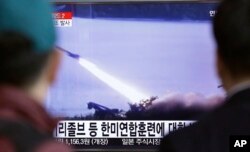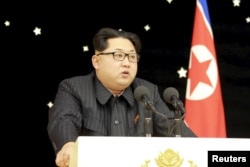President Barack Obama’s swift rejection of a North Korean proposal to suspend further nuclear tests was a bit surprising for a growing number of advocates who believe that international sanctions alone will not persuade the Kim Jong Un government to unilaterally disarm.
In an interview with the Associated Press on Saturday, North Korean Foreign Minister Ri Su Yong said his country is ready to halt its nuclear tests if the United States suspends its annual military exercises with South Korea.
Obama’s response on Sunday saying that Pyongyang would "have to do better than that," seemed to some critics as a missed opportunity to balance pressure tactics with dialogue and diplomacy.
“This proposal was an opening gambit from the North Koreans and we should have teased it out and instead we just shot it down,” said North Korea analyst John Delury with Yonsei University in Seoul.
South Korea's Foreign Ministry also said in a statement Sunday that the North's proposal was "not worth considering."
The United Nations imposed tough new sanctions in March against North Korea for its last nuclear test in January followed by a long-range rocket launch.
North Korea has accelerated its nuclear development program in defiance of U.N. restrictions. Pyongyang has recently attempted both land and submarine based ballistic missiles tests and there are reports that the North is preparing to conduct its fifth nuclear test any day now.
The case for talking
Advocates for more dialogue contend that compromise and negotiations are ultimately the only ways to resolve this nuclear standoff.
“We have to find a way to get back on diplomatic track with the North Koreans and that’s going to be giving up little things here that we don’t want to, in order to get important things from them,” said Delury.
Expressing an interest in discussing the North Korean proposal, they point out, would put immediate pressure on North Korea to delay its fifth nuclear test, which it seems poised to conduct prior to the ruling party congress in early May. The American allies would then have time to gauge Pyongyang’s compliance before making any major concessions because this year’s U.S.-South Korean joint military exercises have for the most part ended.
The South Korean newspaper the Korea Times in an editorial on Monday called for Washington and Seoul to make some sort of counter offer without committing themselves to the North’s proposal.
“This approach can serve two purposes, feeling out the North on its current situation and moving on to start the long absent dialogue, albeit with realistic low expectations,” said the Korea Times editorial.
Proposal shortcomings
Last week the U.S. Deputy Secretary of State Tony Blinken urged North Korea to choose peaceful negotiations over confrontation.
"If a country, even one with which we've had the most profound differences, is prepared to engage seriously and credibly in answering the demands of the international community, we are also prepared to engage," he said.
However, supporters of the hard line U.S.-led policy against North Korea say this proposal is essentially blackmail in that North Korea is trying to set conditions under which it will conform to existing U.N. resolutions banning its nuclear program.
North Korea’s offer to suspend nuclear tests is too vague, they also argue, and does not explicitly include long-range missile launches, nuclear development activities and did not open the door to future international talks to dismantle the North’s nuclear weapons in exchange for economic assistance and security guarantees.
The proposal is seen by many as a transparent attempt to weaken support for sanctions just as their economic impact is beginning to be felt.
Concerns over sanctions
Dialogue proponents argue that maintaining a harsh punitive only approach to North Korea is not sustainable.
While China, as the North’s most important economic partner, supports sanctions, enforcement at the border has so far been lax. Officials in Beijing have said they want to pressure Pyongyang back to international talks but do not want to spark regional instability that would increase a flow refugees at the border, or lead to the collapse of government in Pyongyang.
And South Korea’s recent election could weaken the close alliance between Washington and Seoul in support of sanctions. President Park Guen-hye’s conservative Saenuri party lost its legislative majority in the National Assembly.
The election was more about jobs and economic policy than inter-Korean relations, but the new majority opposition Minjoo Party also supports opening up new channels of communication with the North and resuming the operation of the jointly run Kaesong Industrial Complex, which Park closed in retaliation for Pyongyang’s fourth nuclear test in January.
Youmi Kim in Seoul contributed to this report.







